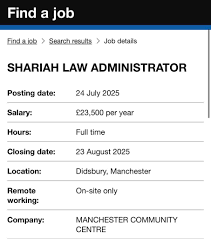Understanding DWP Shariah Law Job Opportunities

Introduction
The demand for professionals versed in Shariah law has seen a significant rise in the UK, particularly in financial and legal sectors. With the Department for Work and Pensions (DWP) increasingly recognising the importance of inclusivity and diversity in its workforce, a range of job opportunities in Shariah law are now available. This trend highlights the integration of cultural understanding within government roles and underscores the relevance of Shariah law in the contemporary job market.
Understanding Shariah Law
Shariah law, derived from Islamic principles, governs many aspects of daily life for Muslims, covering everything from personal behaviour to financial transactions. In the UK, as the Muslim population continues to grow, the importance of Shariah compliance in various industries, especially finance, is increasingly paramount. The DWP has acknowledged this trend, offering positions that require an understanding of Shariah law to ensure compliance and representation.
Current Opportunities in DWP
As of October 2023, the DWP has announced several job openings that involve roles focusing on the implementation and interpretation of Shariah law. These positions range from advisory roles to compliance officers, involving responsibilities such as evaluating financial products for Shariah compliance and advising clients on legal matters that consider Shariah implications. These jobs not only offer competitive salaries and benefits but also the opportunity to work within a diverse and inclusive workplace.
The Importance of Shariah Law in the Job Market
Employers in the UK are increasingly realising the benefits of having staff knowledgeable in Shariah law, as businesses strive to better serve the Muslim community. Companies that provide products and services to Muslim clients often require employees who can navigate the complex legalities surrounding Shariah compliance. The DWP’s initiative to fill these roles may serve as a benchmark for other government departments and private sectors, ultimately benefiting a larger demographic.
Conclusion
The integration of Shariah law expertise within the DWP’s workforce is a progressive move, reflecting broader societal changes towards inclusivity and recognition of diverse cultural practices. As the job market continues to evolve, forecasts indicate that positions requiring knowledge of Shariah law will become more prevalent across various sectors. This trend signals a significant opportunity for professionals aimed at carving a niche within the legal and financial landscapes, shaping a more inclusive future in the UK’s employment environment.







